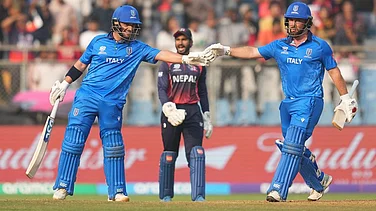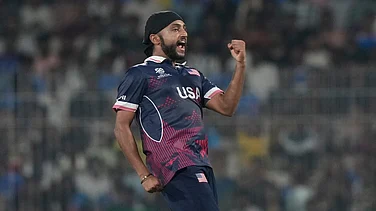THE '83 World Cup was full of upsets from the very first match. On June 9 India shocked the mighty West Indies and took revenge exactly four years after their defeat in the '79 Cup. But the biggest surprise was Zimbabwe's stunning victory over Australia at Trent Bridge the same day. Nine days later the Zimbabweans threatened to repeat the feat against India at Tunbridge Wells. They would surely have succeeded, but for one man called Kapil Dev Nikhanj.
The small Neville Ground, beautifully decorated with rhododendrons, was turned into hallowed space by the Indian captain who essayed an innings of a lifetime that day. The Indians were a despondent lot when they arrived at this venue. Gavaskar was again having a wretched World Cup and, worse still, a rift of sorts had developed between him and his skipper over the opener's omission from the two previous games. Also, as Australia had drawn level with India on points and had a superior run rate in Group B, they needed to not only win but also score around 270 to be sure of qualifying for the semi-finals. Instead, they were reeling at 17 for 5 after winning the toss.
Gavaskar probably owed his recall to Vengsarkar's injury, but failed to grab the opportunity. The last ball of Peter Rawson's first over did him in: out lbw for a duck. India did not score a run until the third over and, in the fifth, Amarnath edged Rawson to keeper Dave Houghton. K. Srikkanth lifted Kevin Curran high to mid-off, only to be caught by Ian Butchart for a blob. Sandeep Patil came and went in a jiffy for 1. Enter Kapil Dev with India reeling at 9 for 4. Meantime, Rawson struck again and consumed Yashpal Sharma. Thirteen overs gone, and it seemed like the baleful hour. In the dressing room Shastri, due in next, and his glum teammates, waited for the captain to lose his wicket any time. "We thought he'd be good for 50 or so but were certain it couldn't last. We waited and waited but he kept hitting them," recalled Shastri.
Kapil had no other option but to launch an onslaught. Roger Binny put out anchor at one end, and they added 60 runs for the sixth wicket, Binny's contribution: 22. After him, Shastri didn't stay long, but Madan Lal gave Kapil good company with a useful 17, the eighth wicket realising 62 runs. India was 140 for 8 and not yet out of the woods. In Syed Kirmani the rampaging Kapil found a more reliable partner. He completed his century and simply went berserk, mercilessly thrashing the bowling. Out of the first 100 of the unbeaten 126-run partnership for the ninth wicket with Kirm-ani, Kapil scored 75—the stand coming in only 13 overs.
From 17 for 5, India marched to 266 for 8 in 60 overs, thanks entirely to Kapil's 175 not out. Kirmani made a valuable 24 runs. Kapil's six sixes and 16 fours set the entire ground ablaze. Quite surprisingly, no details of the balls faced by Kapil are available, although Bill Frindall, BBC statistician, confirms that Kapil's first 100 runs came off only 72 balls. "Unbelievable stuff," was Gavaskar's spontaneous reaction to Kapil's grand knock. "I was in a trance-like state when I began my innings. It was, however, one of those days when nothing could go wrong. I do not believe I will see another day like that in my career," wrote Kapil in his autobiography Cricket My Style. As the BBC staff was on strike that day, there was no telecast or official recording of the match, depriving millions of cricket aficionados of an outstanding batting performance.
Inspired by Kapil's tour de force, the Indian bowlers responded well and sent Zimbabwe packing for 235 in 57 overs, with Kapil himself taking 1 for 32 in 11 overs. Madan Lal took 3 for 42 and Binny 2 for 45. Curran, who had claimed three Indian wickets, waged a lone battle for 24 overs and scored a fine 73. One of Kapil's fondest memories of that match is that he was feeling "absolutely tired" after the completion of the Indian innings. And when he returned to the pavilion he told his boys: "You tired me out!" Perhaps that day Kapil would've flayed any attack. That 175 had the ring of an urgent prophecy about it, one that insisted on being fulfilled.























